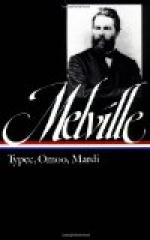“Ah,” said Media as this redoubtable withdrew, Fofi is a cunning knave; a braggart, driven forth, by King Piko for his cowardice. He has blent his tattooing into one mass of blue, and thus disguised, must have palmed himself off here in Pimminee, for the man he is not. But I see many more like him.”
“Oh ye Tapparians,” said Babbalanja, “none so easily humbugged as humbugs. Taji: to behold this folly makes one wise. Look, look; it is all round us. Oh Pimminee, Pimminee!”
CHAPTER XXVII Babbalanja Falleth Upon Pimminee Tooth And Nail
The levee over, waiving further civilities, we took courteus leave of the Begum and Nimni, and proceeding to the beach, very soon were embarked.
When all were pleasantly seated beneath the canopy, pipes in full blast, calabashes revolving, and the paddlers quietly urging us along, Media proposed that, for the benefit of the company, some one present, in a pithy, whiffy sentence or two, should sum up the character of the Tapparians; and ended by nominating Babbalanja to that office.
“Come, philosopher: let us see in how few syllables you can put the brand on those Tapparians.”
“Pardon me, my lord, but you must permit me to ponder awhile; nothing requires more time, than to be brief. An example: they say that in conversation old Bardianna dealt in nothing but trisyllabic sentences. His talk was thunder peals: sounding reports, but long intervals.”
“The devil take old Bardianna. And would that the grave-digger had buried his Ponderings, along with his other remains. Can none be in your company, Babbalanja, but you must perforce make them hob-a-nob with that old prater? A brand for the Tapparians! that is what we seek.”
“You shall have it, my lord. Full to the brim of themselves, for that reason, the Tapparians are the emptiest of mortals.”
“A good blow and well planted, Babbalanja.”
“In sooth, a most excellent saying; it should be carved upon his tombstone,” said Mohi, slowly withdrawing his pipe.
“What! would you have my epitaph read thus:—’Here lies the emptiest of mortals, who was full of himself?’ At best, your words are exceedingly ambiguous, Mohi.”
“Now have I the philosopher,” cried Yoomy, with glee. “What did some one say to me, not long since, Babbalanja, when in the matter of that sleepy song of mine, Braid-Beard bestowed upon me an equivocal compliment? Was I not told to wrest commendation from it, though I tortured it to the quick?”
“Take thy own pills, philosopher,” said Mohi.
“Then would he be a great original,” said Media.
“Tell me, Yoomy,” said Babbalanja, “are you not in fault? Because I sometimes speak wisely, you must not imagine that I should always act so.”
“I never imagined that,” said Yoomy, “and, if I did, the truth would belie me. It is you who are in fault, Babbalanja; not I, craving your pardon.”




